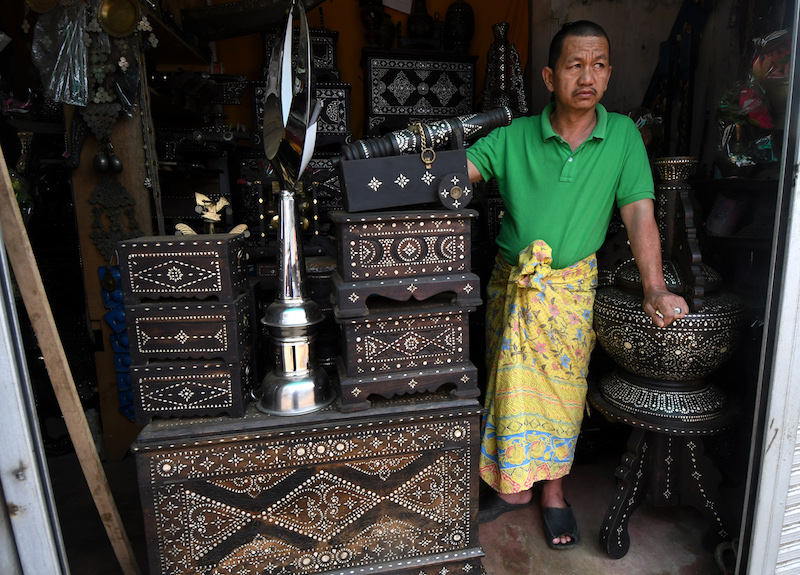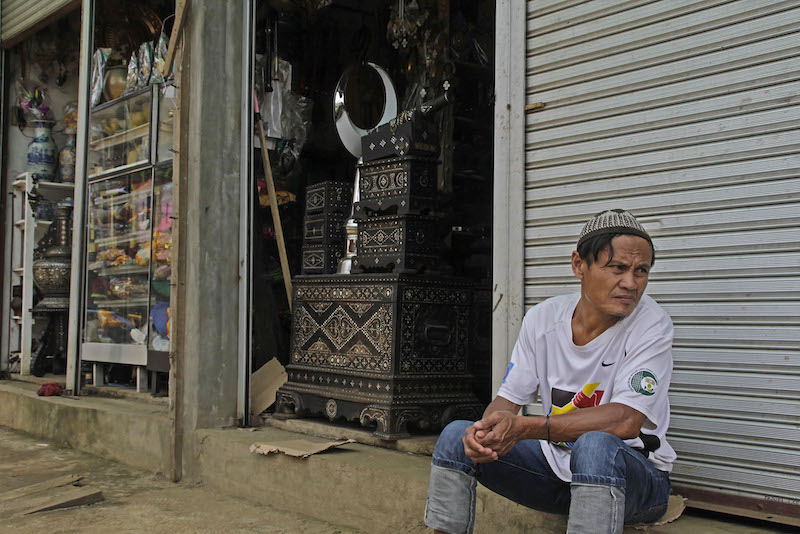MARAWI CITY (MindaNews / 11 August) — Samsoden Calauto has been selling Maranaw traditional crafts in his store between the Lancaf Mosque and the Philippine National Police provincial headquarters for about a decade now, earning substantial income that allowed him to pay for the monthly P8,000 peso rent and send his six children to school.
Until the war broke out on May 23.
Calauto’s Tugaya Antique shop is located in Barangay Basak Malutlut, 200 meters from the Mindanao State University (MSU) main campus some 700 meters from the area near the Markaz Mosque where the first shots were fired on May 23 between government forces and the ISIS-inspired Maute Group and the Abu Sayyaf led by high value target Isnilon Hapilon, who was supposed to have been served with the warrant of arrest.
 Samsoden Calauto closed his shop along Barangay Basak Malutlut near the main entrance of the Mindanao State University for a day or two only since the Marawi Crisis began on May 23. He continues to open daily, even if there are no buyers. MindaNews photo by FROILAN GALLARDO,
Samsoden Calauto closed his shop along Barangay Basak Malutlut near the main entrance of the Mindanao State University for a day or two only since the Marawi Crisis began on May 23. He continues to open daily, even if there are no buyers. MindaNews photo by FROILAN GALLARDO,
The shop owner and his family did not evacuate because “saan kami pupunta?” (where will we go?).
The Marawi Crisis entered Day 80 on Thursday but Calauto says he closed shop only for a day or two.
Most of the commercial establishments on that street have yet to reopen but every day Calauto would open his shop (part of which also serves as his home) at 7 a.m. even if no one would stop to buy.
Since Day One of the crisis, Calauto managed to earn some amount from two sectors who have been flocking to the country’s lone Islamic City — journalists and soldiers — while nearly all of its 210,000 residents fled to towns and cities near and far, in Mindanao, Visayas and Luzon.
Before the war, Calauto was earning an average of 5,000 pesos in sales and on a good day, up to 20,000 pesos.
His shop sells items such as brassware, betel nut boxes, decors made of old Philippine coins, baur (Maranaw wooden chest with mother of pearl inlay), gadur (ceremonial urns), kampilan, malong landap, the under-a-thousand peso miniature baurs and table decors, a few under-a-hundred peso items like small mobile phone holders made of balud or purses made from a combination of balud and langkit.
Barangay Malutlut was a restricted area until a few weeks ago, but remained home to Calauto and other residents here who did not evacuate even as it meant spending their days and nights jolted by the sound of explosions from bombs dropped from the skies on the main battle area some five kilometers away.
Calauto is grateful to journalists and soldiers who came to his shop, no matter how few they were. He spoke of journalists, particularly from foreign entities who dropped by on their way to or from the MSU, to interview them and buy souvenir items as well.
Hundreds of journalists have flocked to this city since May 23, while thousands of soldiers and police personnel have been deployed here from all over the country.
Calauto said he also earned some amount last month from the MSU for some items used in the graduation held in Iligan City.
“Just enough to be able to buy food,” he said in Filipino. The landlord did collect payment for the rent but after negotiations, allowed him to just pay 3,000 pesos.
He expects his business to recover once the situation returns to normal but when that will be, no one can say for now.
For now his principal concern is to be able to sell some items to ensure there is food on the table for his family.
 A resident of Basak Malutlut in Marawi City whiles away the time on Thursday (10 August 2017) outside a shop selling traditional Maranao crafts. MindaNews photo by MARCOS C. MORDENO
A resident of Basak Malutlut in Marawi City whiles away the time on Thursday (10 August 2017) outside a shop selling traditional Maranao crafts. MindaNews photo by MARCOS C. MORDENO
Calauto gets his supply from Tugaya, the town famous for manufacturing the wood and brass items.
He took out from a shelf some items made of small pieces of brass engraved with “Marawi City” and said the artisan who did it is “patay na” (already dead). The artisan, based in Padian, the public market located within the main battle area, was killed. “Nabombahan,” he said.
More stores selling antiques and other items similar to Calauto’s shop are located at Perez Street, near the Padian.
But the shops have reportedly been burned, the Maranaw crafts and antiques in them among the casualties of the Marawi war. (Carolyn O. Arguillas / MindaNews)
